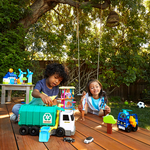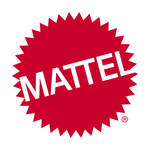Mattel Announces Goal to Reduce Plastic Packaging by 25% per Product by 2030 and Publishes Latest Citizenship Report

New goal complements other previously announced sustainable product and packaging goals, including to achieve 100% recycled, recyclable, or bio-based plastic materials in products and packaging by 2030
EL SEGUNDO, Calif.–(BUSINESS WIRE)–Mattel, Inc. (NASDAQ: MAT) has announced a new goal to reduce plastic packaging by 25% per product by 20301. This new goal is featured in the company’s 2021 Citizenship Report published today, which provides a progress update on Mattel’s Environmental, Social, and Governance (ESG) strategy and established goals.
Mattel’s ESG strategy and goals are organized into three pillars: Sustainable Design and Development; Responsible Sourcing and Production; and Thriving and Inclusive Communities, representing the ESG areas where the company believes it can have the greatest impact.
“At Mattel, our aim is to contribute to a more diverse, equitable, inclusive, and sustainable future,” said Ynon Kreiz, Chairman and CEO, Mattel. “The progress across our ESG strategy and goals, and our new goal announced today, reflects our ongoing commitment to corporate citizenship and our purpose to empower the next generation to explore the wonder of childhood and reach their full potential. I would like to thank all the teams across Mattel and our external stakeholders for their partnership on this important journey.”
With its new packaging goal, Mattel is focused on reducing plastic materials from product packaging, including polybags, window sheets, and blister packs as part of its packaging strategy and reduction approach.
Progress highlights across the three ESG pillars and previously published goals are as follows:
Sustainable Design and Development
Mattel aims to develop innovative products and experiences that are better for the world by integrating sustainable materials with principles of product stewardship and circular design. In this pillar the company has:
- Exceeded its goal to maintain 95% recycled or Forest Stewardship Council (FSC)-certified content in the paper and wood fiber used in its products and packaging, reaching 97.9% in 2021 as validated by the Rainforest Alliance.
- Recognized by the FSC with a 2021 Leadership Award for excellence in the use of FSC-certified products and commitment to responsible forest management.
- Increased the amount of recycled PET (polyethylene terephthalate) in most window cartons and blister packs from 25% in 2020 to 30% in 2021.
- Launched Mattel PlayBack, a toy takeback program in the U.S., Canada, France, Germany, and the UK, designed to recover and reuse valuable materials from old Mattel toys.
-
Progressed its goal to achieve 100% recycled, recyclable, or bio-based plastic materials in products and packaging by 2030 with several new products made from more sustainable materials and other initiatives including:
- Barbie Loves the Ocean, its first fashion doll line made from recycled ocean-bound plastic2.
- Matchbox Tesla Roadster, its first die-cast vehicle made from 99% recycled materials and certified as a CarbonNeutral® product.3
- UNO Nothin’ But Paper! eliminated the cellophane wrapping from all UNO card games, replacing it with FSC-certified paper.
- Mega Bloks Green Town, a new line of certified CarbonNeutral® products3 in which the blocks and pieces are made from a mix of plant-based materials (plastic made from ethanol extracted from sugar cane) and ISCC-certified bio-circular plastics (using a mass balance approach).
Responsible Sourcing and Production
Mattel aims to optimize resource use in operations to reduce environmental effects and promote ethical sourcing practices and worker health and safety throughout the supply chain. In this pillar the company has:
- Accelerated progress toward Mattel’s goal to reduce Scope 1 and 2 Greenhouse Gas (GHG) Emissions by 50% by 20304 reporting an 8% reduction in absolute Scope 1 and 2 GHG emissions versus the 2019 baseline year. The Scope 1 and 2 GHG emissions data disclosed in the 2021 Citizenship Report has been verified by an independent third-party verification body, SCS Global Services.
- Advanced toward its goal to achieve zero manufacturing waste by 2030.5 The company conducted two on-site waste characterization audits at its manufacturing facility in Monterrey, Mexico, and its distribution center in San Bernardino, California, which informed the creation of a new Mattel Waste Management Standard.
- Achieved a 79% waste diversion rate in 2021.6
- Established the Mattel Responsible Sourcing Working Group, a cross-functional team of internal experts to support Responsible Sourcing and Production, and to promote ethical sourcing practices and worker health and safety throughout Mattel’s supply chain, in 2021.
Thriving and Inclusive Communities
Mattel aims to make a positive social impact through purposeful play and by supporting diverse, equitable, and inclusive communities where we live, work, and play. In this pillar the company has:
- Progressed toward its global Diversity, Equity, & Inclusion goals of increasing representation of women and ethnically diverse talent, and achieved 100% base pay equity by gender globally and by ethnicity in the U.S.7
- Received the following notable recognitions for its workplace culture: Forbes World’s Best Employers of 2021; Forbes Best Employers for Women 2021; Fast Company Best Workplaces for Innovators 2021; Great Place to Work® Certified 2021; Newsweek Top 100 Most Loved Workplaces for 2021; Human Rights Campaign Best Places to Work for LGBTQ Equality 2021; and 2021 Time Most Influential Companies.
“We are proud of the progress we have made in the past year toward our ESG goals and recognize that there is much more to be accomplished. Our new plastic packaging goal responds to increasing global attention on single-use plastic packaging waste, and addresses changing consumer preferences,” said Pamela Gill-Alabaster, SVP, Global Head of Sustainability and Social Impact, Mattel. “Our teams strive to continue to innovate with principles of circular design and product stewardship to develop products and packaging that are better for our planet.”
Forward-Looking Statements
This press release contains forward-looking statements within the meaning of the Private Securities Litigation Reform Act of 1995, including, with respect to the Company’s expectations, plans, or goals related to corporate responsibility, employees, sustainability and environmental matters, policy, business, procurement, and other risks and opportunities. Forward-looking statements can be identified by the fact that they do not relate strictly to historical or current facts. The use of words such as “anticipates,” “commit,” “expects,” “intends,” “plans,” “estimates”, “goal,” “target,” “confident that,” “will,” and “believes,” among others, generally identify forward-looking statements. These forward-looking statements are based on currently available operating, financial, economic, and other information and assumptions that are subject to change in the future, as well as standards for measuring progress that are still in development and are subject to a number of significant risks and uncertainties. Forward-looking statements are also aspirational and not guarantees or promises such expectations, plans, or goals will be met. A variety of factors, many of which are beyond Mattel’s control, could cause actual future results to differ materially from those projected in the forward-looking statements, and are currently, and in the future may be, amplified by the COVID-19 pandemic. Specific factors that might cause such a difference include, but are not limited to, assumptions not being realized, evolving ESG strategies, scientific or technological developments, changes in carbon markets, or other changes in circumstances, as well as the factors described in Mattel’s periodic filings with the SEC, including the “Risk Factors” section of Mattel’s Annual Report on Form 10-K for the fiscal year ended December 31, 2021, as well as in Mattel’s other public statements. Mattel does not update forward-looking statements and expressly disclaims any obligation to do so, except as required by law.
About Mattel
Mattel is a leading global toy company and owner of one of the strongest catalogs of children’s and family entertainment franchises in the world. We create innovative products and experiences that inspire, entertain, and develop children through play. We engage consumers through our portfolio of iconic brands, including Barbie®, Hot Wheels®, Fisher-Price®, American Girl®, Thomas & Friends®, UNO®, Masters of the Universe®, Monster High® and MEGA®, as well as other popular intellectual properties that we own or license in partnership with global entertainment companies. Our offerings include film and television content, gaming and digital experiences, music, and live events. We operate in 35 locations and our products are available in more than 150 countries in collaboration with the world’s leading retail and ecommerce companies. Since its founding in 1945, Mattel is proud to be a trusted partner in empowering children to explore the wonder of childhood and reach their full potential. Visit us online at mattel.com.
1 Versus 2020 Baseline. Changes are calculated based on the plastic packaging materials intensity ratio, which is obtained by dividing the total volume of plastic packaging materials used (in metric tons) by the total number of units produced in the applicable period, and where the total number of units produced is the number of production units shipped by Mattel, through its owned and/or operated manufacturing facilities and finished goods manufacturers.
2 Plastic parts made from 90% plastic sourced within 50 km of waterways in areas lacking formal waste collection systems; doll head, shoes, tablet, and beach lantern accessory excluded.
3 CarbonNeutral® is a certification issued by Natural Capital Partners, the leading experts on carbon neutrality and climate finance, which indicates a current state achieved when the net GHG emissions associated with an entity, product, or activity is zero for a defined duration.
4 Versus 2019 baseline. Absolute Scope 1 + 2 GHG Emissions defined as total Scope 1 GHG emissions from on-site fossil fuel consumption and fleet fuel consumption, and total Scope 2 GHG emissions from purchased electricity, steam, heat, or cooling; applies to all Mattel-owned and/or -operated sites, including manufacturing facilities, dormitories, distribution centers, warehouses, retail stores, and corporate locations over 20,000 square feet.
5 Defined as 90% of manufacturing waste being either diverted from the landfill or incinerated with energy recovery, except where otherwise directed by local regulations.
6 For the purposes of this calculation, “waste diverted” is categorized as waste that is reused, recycled, or waste incinerated with energy recovery.
7 As at December 31, 2021.
Contacts
Amarilis Whitty
amarilis.Whitty@Mattel.com

